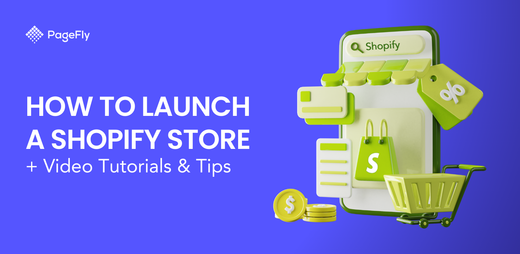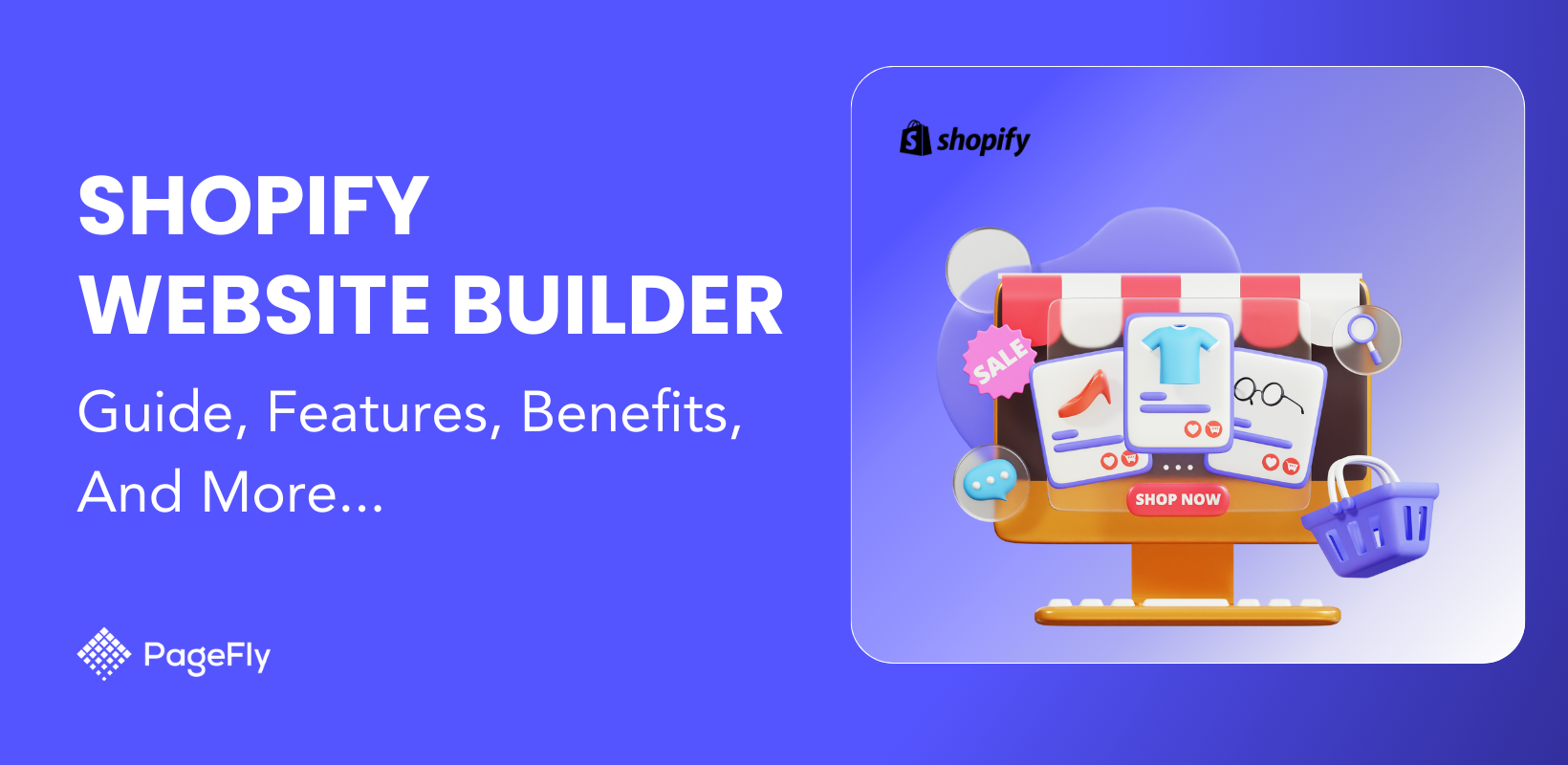The Shopify CMS is a powerful platform that allows millions of merchants worldwide to run online stores of all sizes – from a small startup to an enterprise-level ecommerce store.
That’s because when you establish an online store with Shopify, you get access to many key features such as marketing automation tools, inventory management, analytics tools, and more.
With all these in mind, starting a small online store using the Shopify platform is a no-brainer. But the same can’t be easily said for those who are looking to establish a complex ecommerce store. That’s because an enterprise-level ecommerce store has a whole lot of complex needs that need to be met – the most important of which is flexibility. Hence the decision to use a headless CMS.
But this begs the question, “Is Shopify’s content management system headless or monolithic?”
Well, if you’re aching for an answer, you’re on the right page. Because in this article we’ll answer all these questions:
- What is a CMS platform and what are the types of CMS?
- Is Shopify a headless ecommerce platform?
- What are the key features of Shopify’s CMS?
- What are the best CMS integrations for Shopify?
So without wasting any more time, let’s begin.
Want to know the answer right now? Jump to this section.
What Is A CMS?

Source: Pexels
A Content Management System (CMS) is a software or platform that allows users to create, manage, and modify digital content on a website.
There are two types of CMS platforms:
- Monolithic CMS
- Headless CMS
A CMS platform provides an intuitive interface for managing web content, thus enabling users to perform customizations, personalizations, and add multimedia elements. It also offers various tools for organizing and structuring content, managing user permissions, and handling site navigation.
Use cases for CMS platforms are vast. They can be used for personal blogs, corporate websites, online portfolios, news sites, and ecommerce stores.
For ecommerce, a CMS allows online businesses to:
- Manage product listings
- Track inventory
- Process orders
- Integrate with payment gateways
- Integrate customer relationship management or CRM tools
- And more.
In identifying whether the Shopify CMS falls under the monolithic or headless definition, it’s essential to first understand the differences between these two types of platforms.
As such, let’s talk about them below.
What Is A Monolithic CMS?
A monolithic CMS platform is a traditional content management system where the front-end or the presentation layer and back-end or data management layer are unified into a single software or application.
This tightly integrated structure means that everything from content creation to website rendering is managed within a single system – thus making most monolithic ecommerce platforms easy to use and beginner-friendly.
With those characteristics in mind, monolithic CMS platforms are designed to provide an all-inclusive solution for content management, courtesy of in-built themes, templates, and easy-to-install plugins that simplify website development and maintenance.
Best Use Cases for a Monolithic CMS Platform
Since monolithic CMS platforms are designed to be beginner-friendly, these are best suited for small to medium-sized ecommerce businesses, personal blogs, and websites that require a straightforward setup and management process.
Moreover, they are ideal for users who prefer an out-of-the-box solution with very minimal configuration. Additionally, these platforms are suitable for organizations that do not have a complex content distribution need and can benefit from the ease of use.
As such, monolithic ecommerce platforms are significantly cheaper to build and operate than headless ecommerce stores.
Pros and Cons of Monolithic CMS Platforms
Pros:
- Ease of Use: Monolithic CMS platforms offer a user-friendly interface that requires little time to learn. They also come with integrated tools that simplify content management and site customization.
- Cost-Effective: This type of CMS platform comes with pre-built themes, plugins, and useful features, reducing the need for extensive custom development.
- Quick Setup: Monolithic CMS platforms mostly come almost ready to use as out of the box and require little customization and personalization before deployment. Thus making website setup fast and straightforward.
Cons:
- Limited Flexibility: For enterprise-level businesses, the tightly integrated structure is disadvantageous because it limits customization and scalability.
- Performance Issues: Monolithic CMS platforms run the risk of slowing down when loaded with lots of content, features, and apps, leading to slower performance and longer load times.
- Vendor Lock-In: Depending on your choice of monolithic CMS, it could be hard to switch platforms in the feature if you find your current CMS lacking.
What Is A Headless CMS?
A headless CMS platform, on the other hand, is the total opposite of the monolithic. Headless CMS platforms come with the front-end and back-end decoupled.
This means that the CMS focuses solely on content management while the front-end or presentation layer can be built separately with a separate tech stack.
In a headless CMS, APIs play a crucial role because all content is relayed via APIs, allowing the content to be displayed on various devices, channels, websites, apps, and IoT devices.
With that in mind, a headless CMS offers greater flexibility and scalability, making it ideal for a wider-scale content distribution.
Best Use Cases for a Headless CMS Platform
If monolithic CMS platforms are best suited for websites and ecommerce stores that don’t require complex functionalities, a headless CMS platform is best suited for complex websites and enterprise-level ecommerce stores that require a high degree of customization and scalability.
They are highly recommended for businesses that need to deliver content across multiple channels and devices consistently.
Additionally, in terms of web development, a headless CMS is perfect for development teams that prefer to use modern front-end frameworks and tools to create unique and dynamic user experiences.
With that in mind, developing a headless ecommerce platform for your business can be very costly because of the amount of work and the high-level skills needed to execute one.
Pros and Cons of Headless CMS Platforms
Pros:
- Flexibility: Since the front-end and back-end of headless CMS platforms are decoupled, developers can use any tech stack for the presentation layer, offering unmatched customization.
- Scalability: A headless ecommerce platform can easily handle large amounts of content and traffic, making it suitable for enterprise-level usage.
- Multi-Channel Delivery: Content on a headless CMS platform can be delivered seamlessly across various platforms and devices, ensuring a consistent user experience.
Cons:
- Complexity: Headless ecommerce platforms are extremely complex to execute, thereby requiring technical expertise.
- Higher Costs: The need for high-level development skills in integrating various systems requires more man hours, thus leading to higher initial and ongoing costs..
- Fragmented Ecosystem: Since a headless ecommerce platform is stacked with different technologies, managing and maintaining them can create challenges.
In conclusion, whether Shopify operates as a headless or monolithic platform, understanding the differences between these CMS models helps determine the best approach for your specific e-commerce needs.
Is Shopify Headless CMS Or Monolithic?

Source: Shopify
There is a mix of confusing information regarding whether Shopify’s CMS platform is headless or monolithic. Some say that Shopify is monolithic and others say that the Shopify CMS is a headless ecommerce platform.
To put an end to the confusion, here’s the answer that you’re looking for:
Shopify, by default, is a MONOLITHIC ecommerce platform. As such, when you subscribe to any Shopify plan (Basic, Shopify, or Advanced), you get an easy-to-setup platform for your ecommerce store.
But here’s the thing, if you want a headless CMS for the complex needs of your online store, you can also do that with the Shopify API.
We went ahead and contacted Shopify support to confirm if this information is factual this is what the Shopify specialist named, Cristine had to say:
“...not all Shopify plans are inherently headless. Shopify operates as a monolithic platform by default, but it offers robust APIs that allow for headless integrations. This means you can decouple the front-end and back-end , giving you the flexibility to use Shopify as a headless CMS if you choose.”

So there you have it, the answer to the question stated in the title of this article.
It’s amazing how Shopify can be so malleable as to satisfy the needs of both small and large businesses. Thus, if you plan to start a small business with the hopes of growing and scaling it in the coming years, you can stick with Shopify CMS from your startup years to when you reach enterprise level.
On the other hand, if you are planning to switch from a different platform or if you’re looking for a new one with the proper complexity and flexibility for all your needs, Shopify is the best platform for you as well.
With that in mind, let’s talk more about Shopify CMS in the next sections.
More information about going headless with Shopify: Options for building headless
Key Features Of Shopify CMS

Here are the key features of the Shopify CMS as a monolithic ecommerce platform by default.
Marketing Automation Tools
The Shopify CMS comes with a set of marketing tools that streamline your marketing efforts. Moreover, you can integrate other apps to set up email campaigns, automate social media posts, and manage promotions.
This feature allows online store owners to target the right audience to increase engagement and boost conversions. Moreover, automation is essential for efficient and effective marketing across all your sales channels.
Inventory Management
Inventory management is one of the highlights of the Shopify CMS. As an ecommerce platform, Shopify store owners can easily track stock levels, manage complex SKUs, and automate reorder notifications.
Shopify’s inventory management helps maintain the right amount of inventory to prevent you from overstocking or understocking. At the same time, it allows merchants to easily calculate costs using tax and shipping presets.
With the advanced inventory management of the Shopify CMS, order tracking and fulfillment is way easier, making Shopify an ideal solution for growing ecommerce brands.
Customization Options
The Shopify CMS offers an extensive range for customization, allowing online store owners to personalize their shops according to their brands’ unique identity.
From an intricate yet easy-to-use theme editor to more advanced page builders like PageFly, you can create a visually appealing and functional website without the complexity of a headless CMS.
This design flexibility ensures that each Shopify store stands out from the rest while providing a top-notch shopping experience to each customer.
Wide Range Of Themes
In addition to Shopify’s customization features, you can find more than 200 store templates from the Shopify theme store – ranging from free themes to premium ones.
And here’s the thing, all Shopify themes are easily customizable so that you can make your store that’s unique to your brand.
Analytics Tools
An ecommerce platform won’t be complete without a set of reporting tools. That’s why the Shopify CMS comes with a set of detailed analytics tools to track various metrics such as sales, customer behavior, traffic sources, and more to help you make data-driven decisions.
By leveraging these tools, you can identify emerging trends and opportunities to take your business to greater heights.
10,000+ Apps In The Shopify App Store
The Shopify CMS is the world’s largest ecommerce platform not just in terms of user base, but also in terms of apps. The Shopify ecosystem is composed of more than 10,000 apps in the Shopify app store – offering massive options to extend the functionality of each online store depending on its distinct needs.
These apps offer solutions for marketing, inventory management, customer services, design, and more. The vast selection of purpose-built apps ensures that each Shopify store owner can find the right tools to achieve all his ecommerce needs.
Search Engine Optimization
The Shopify CMS includes robust optimization features that help improve your store’s visibility on search engines like Google. For one, Shopify stores are built to have fast load speed. Additionally, all pages come with SEO optimization sections so you can include important keywords.
These features include customizable meta descriptions, site maps, clean URL structures, and simpler store navigation among other things.
In-Built CRM
The Shopify CMS comes with a basic yet highly useful customer relationship management or CRM tool. This enables online stores to manage customers effectively.
This tool helps track customer interactions, categorize your audience, and run personalized marketing efforts according to your audience segmentation.
With Shopify’s in-built CRM, you can enhance customer engagement, improve retention rates, and deliver an overall better shopping experience.
Mobile Responsiveness
The Shopify CMS is mobile responsive right off the bat – regardless of your subscription plan. This ensures that your store looks great and functions well regardless of the device your target customers are using.
With more consumers who are using their smartphones, Shopify’s mobile responsiveness helps you reach a broader audience and improve customer satisfaction.
Security
Security is a top priority for the Shopify CMS. The platform comes with SSL certificates, PCI compliance, and other security features that protect both the merchant and the customers.
These measures protect your store and customer data from cyber threats, thereby creating peace of mind among all users knowing that they are protected when shopping online.
Simplicity
The Shopify CMS was built with most types of users in mind. As such, it has to be simple yet powerful. And one of the standout key features of Shopify is its simplicity. As mentioned before, Shopify is user-friendly, making it easy for anyone to set up and manage an online store.
However, Shopify can also handle complex needs if needed. For that purpose, merchants can’t be expected to know how to build a complex Shopify store while still running a business. And that’s why the Shopify Partners Directory is here to help you find professionals to help you build an advanced online store.
Integration with Headless CMS Platforms
Lastly, although the Shopify CMS is monolithic by default, advanced users can still use it to create a headless ecommerce store. That’s because the Shopify APIs can be integrated with various headless platforms to create a more flexible online store.
Thus, if you are looking for advanced features to accommodate your global brand and create a dynamic omnichannel experience, going headless with Shopify is your best choice.
In the next section, we’ll talk about the best Shopify plan to use if you’re planning to go headless.
Best Plan For Shopify CMS Integration

Source: Shopify
We’ve already discussed that going headless with your Shopify store has some great benefits for your ecommerce business. That is, in exchange for the high development and maintenance cost of managing a headless ecommerce store.
Be that as it may, if your needs truly call for a headless Shopify store, we believe that the benefits will outweigh the cost in the long run.
With that, let’s talk about the best Shopify subscription plan when going headless.
Quick read: Shopify vs Shopify Plus: An All-around Review (Pricing + Features)
Shopify Pricing
Shopify has four subscription plans for those who want to build an online store:
- Basic - $39 per month ($29 per month if billed annually)
- Shopify - $105 per month ($79 per month if billed annually)
- Advanced - $399 per month ($299 per month if billed annually)
- Plus - start at $2000 per month
Which Plan Is Best For Headless Ecommerce?
To answer this question, let’s continue our conversion with our Shopify advisor, Christine.
Cristine said that “...Shopify can indeed function both as a monolithic platform and as a headless e-commerce solution, depending on your needs.”
Furthermore, she continued by saying, “To utilize Shopify as a headless e-commerce platform, you can choose from any of the Shopify plans, as they all provide access to the necessary APIs. However, for the best experience and advanced capabilities, particularly if you anticipate high traffic or complex integrations, Shopify Plus is highly recommended.”

With that in mind, it’s best to follow the advice of Shopify advisors if you’re planning to go with a headless Shopify CMS.
Come to think of it, although all Shopify plans have the needed APIs to go headless, it doesn’t make sense to use a Basic plan and spend money on going headless because you won’t be able to maximize the capability of your online store.
Shopify CMS Headless API
There are two terms that you need to know first when going for a headless Shopify CMS – these are Hydrogen and Oxygen.
Shopify Hydrogen is a React-based framework that’s designed for building headless storefronts on the Shopify platform. As such, Hydrogen provides developers with the tools and components necessary to create fast, dynamic, and highly customizable ecommerce experiences.
On the other hand, Shopify Oxygen is a hosting platform that’s designed to run custom storefronts built with Shopify Hydrogen. It provides the infrastructure needed to deploy and scale these storefronts efficiently. As an in-house solution, Oxygen integrates seamlessly with any Shopify plan, offering a robust environment for hosting, managing, and scaling headless Shopify stores.
Learn more about Shopify Hydrogen and Oxygen: Getting started with Hydrogen and Oxygen
Best CMS For Shopify Headless Storefront
The Shopify CMS can handle complex ecommerce needs. In fact, for most users, going headless is not necessary. But to those who find Shopify’s content management system lacking in terms of scalability, creating headless storefronts is the best way to go.
And now that you know the framework and hosting needed for building headless CMS (Hydrogen and Oxygen), let’s now take a look at the CMS platforms that you can use for going headless in Shopify.
Sanity

Source: Sanity
G2 Rating: 4.7/5 (780+ reviews)
Sanity delivers unparalleled content flexibility and management as a headless CMS, offering a fully decoupled, real-time backend.
Its main feature, the Sanity Composable Content Cloud, empowers users with customizable content workspaces that enhance velocity and creativity.
Additionally, its robust APIs form the backbone of seamless content architecture, while the Content Lake feature ensures no-ops storage and distribution, syncing content across teams for optimal collaboration and efficiency.
Key Features
- Advanced Content Modeling: Create custom content structures with fields and types to suit the needs of ecommerce stores.
- Advanced CDN: Optimize speed, performance, and scalability by serving content directly from the network edge.
- Collaborative Editing: Multiple users can manage data simultaneously without potential security risks.
- Intuitive User Interface: User-friendly for both developers and non-developers.
Strapi

Source: Strapi
G2 Rating: 4.6/5 (180+ reviews)
Strapi headless CMS revolutionizes back-end development with rapid app creation, transforming weeks of work into minutes.
As an open-source platform, Strapi's codebase is maintained by a global community on GitHub which ensures continuous improvement and innovation to keep up to speed with modern tech.
Additionally, Strapi’s highly customizable admin panel and API, along with RESTful and GraphQL capabilities, cater to modern tech stacks.
Lastly, Strapi offers flexibility with self-hosting options and the fully managed Strapi Cloud, providing complete control and eliminating vendor lock-in.
Key Features:
- Open Source Platform: Fully customizable, with access to the latest features from the GitHub community.
- Flexibility: Expandable capabilities with plugins and APIs to meet the unique and specific needs of Shopify online stores.
- Powerful Analytics: Enables users to track customer behavior to optimize user experience and marketing strategies.
Hygraph

Source: Hygraph
G2 Rating: 4.5/5 (320+ reviews)
Hygraph headless CMS maximizes content potential with its GraphQL-native, API-first headless CMS, designed for mission-critical applications.
Hygraph’s composable structure overcomes content silos, enabling unified content management and delivery across platforms with speed.
Furthermore, Hygraph's efficient content querying and unique Content Federation capability streamline data integration.
Hygraps can be tailored to meet the specific needs of ecommerce stores, facilitating the rapid development and deployment of digital products at scale.
Key Features:
- Inventory Management: Track stock levels and manage product descriptions.
- Marketing Automation: Create targeted campaigns and track customer conversion rates.
- Personalization at Scale: Incorporate CDP, DMP, and martech for exceptional customer experiences.
- Omnichannel Content Delivery: Distribute content seamlessly across different platforms and devices.
Agility

Source: Agility
G2 Rating: 4.4/5 (160+ reviews)
Agility CMS stands out as a developer-friendly, easy-to-use content management system that’s highly recommended by both technical teams and marketers.
Beyond its headless capabilities, its composable architecture allows for the seamless assembly of reusable components, ensuring faster development and enhanced security.
Additionally, Agility's flexible API-first platform supports any front-end and coding language, enabling businesses to deliver content efficiently using the tech stack that they know most.
Its iterative approach facilitates rapid innovation and adaptation to changing requirements, driving superior digital experiences.
Key Features:
- Visual Editor: Drag-and-drop interface for creating and editing content.
- Content Modeling: Create custom content models tailored to your business needs.
- Multi-Language Support: Manage content in multiple languages.
- Integration: Seamlessly integrates with Shopify Plus and other platforms.
Prismic

Source: Prismic
G2 Rating: 4.3/5 (230+ reviews)
The Prismic Shopify CMS empowers marketers to rapidly release on-brand pages using their preferred tech stack. Hence, making it the ideal headless page builder for Next.js, Nuxt, and SvelteKit sites.
Prismic’s headless architecture enhances performance, while at the same time, simplifies maintenance. Additionally, its innovative Slices feature allows for the creation of customizable website sections, ensuring brand consistency and speed in development.
The Visual Page Builder enables marketers to independently create beautiful pages, leveraging the developer-built Slice Machine for streamlined content management.
Key Features:
- Intuitive User Interface: Easy navigation for efficient content management.
- Flexible Data Modeling: Customizable content organization without predefined constraints.
- Powerful APIs: Facilitate easy data access and integration.
- Omnichannel Content Delivery: Efficiently deliver tailored content across various devices and locations.
These headless CMS platforms offer powerful tools and integrations that work seamlessly with Shopify, enabling businesses to manage and deliver content efficiently across various channels and devices.
Conclusion
Going for a headless online store is not a decision most online entrepreneurs get to make. That’s because not all online stores reach the scale of enterprise level.
Additionally, a headless ecommerce platform comes with some complexities and costs that could only benefit those types of businesses with actual needs. And these are usually global retail and B2B businesses.
As such, if you’re just starting with your ecommerce business, the Shopify CMS is more than enough. On the flip side, if you find your business limited by what the Shopify CMS could offer in your day-to-day operations, consider using a Shopify Plus plan – and then go headless if needed.
Read more: Best Shopify Blog Examples: What Are Their Secrets? (Updated 2024)




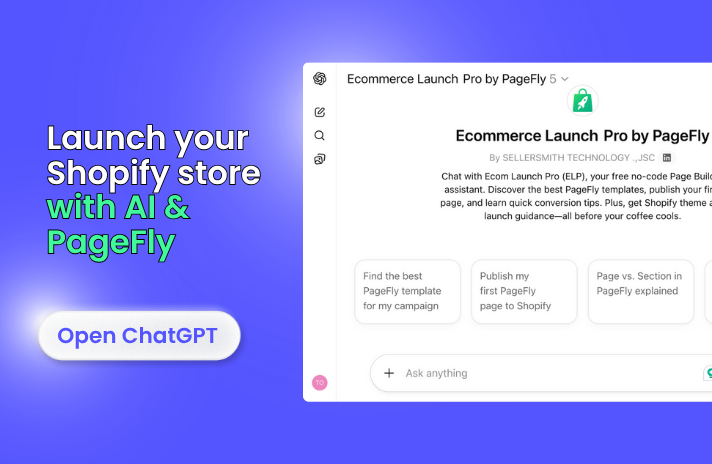
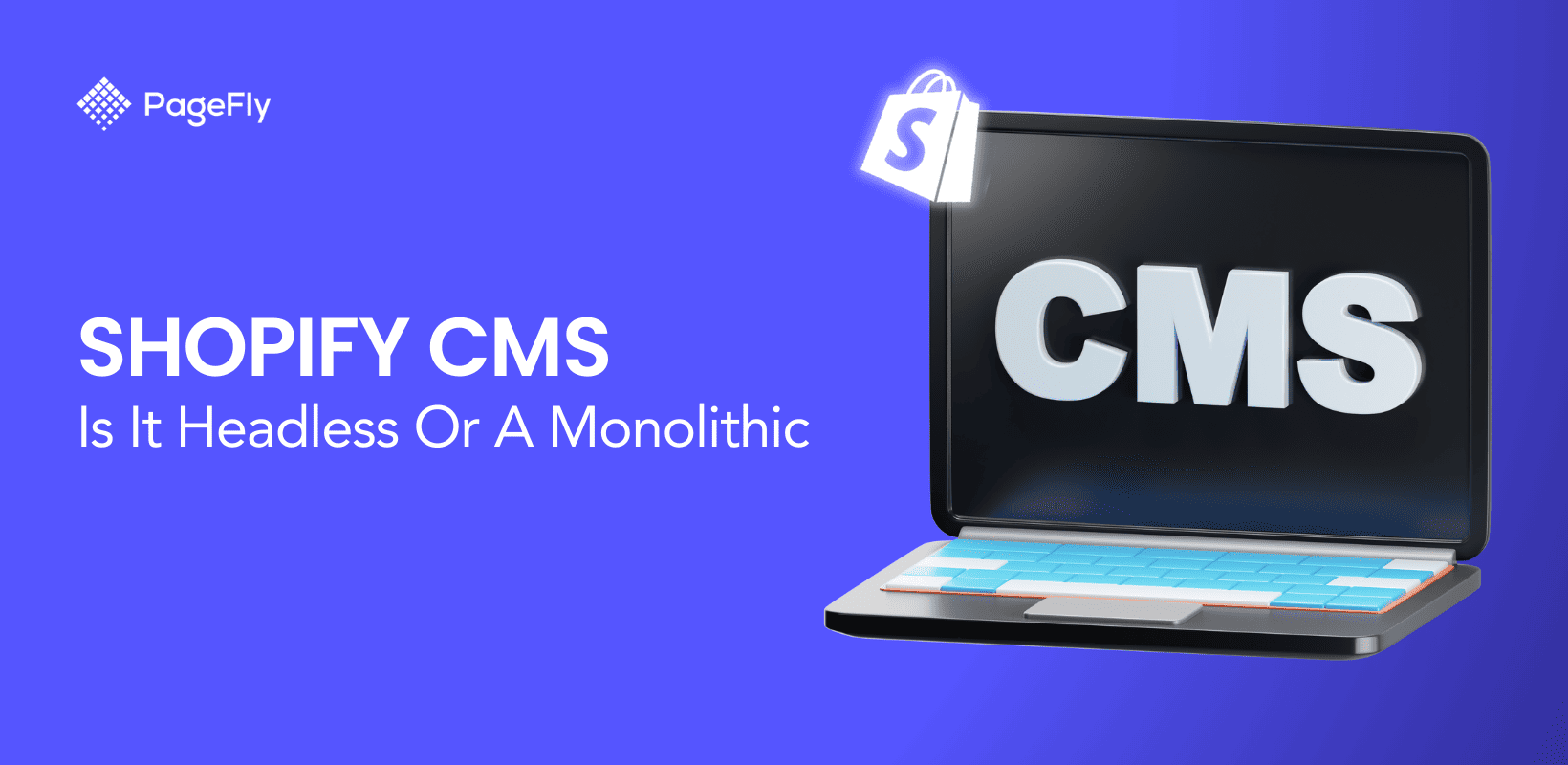


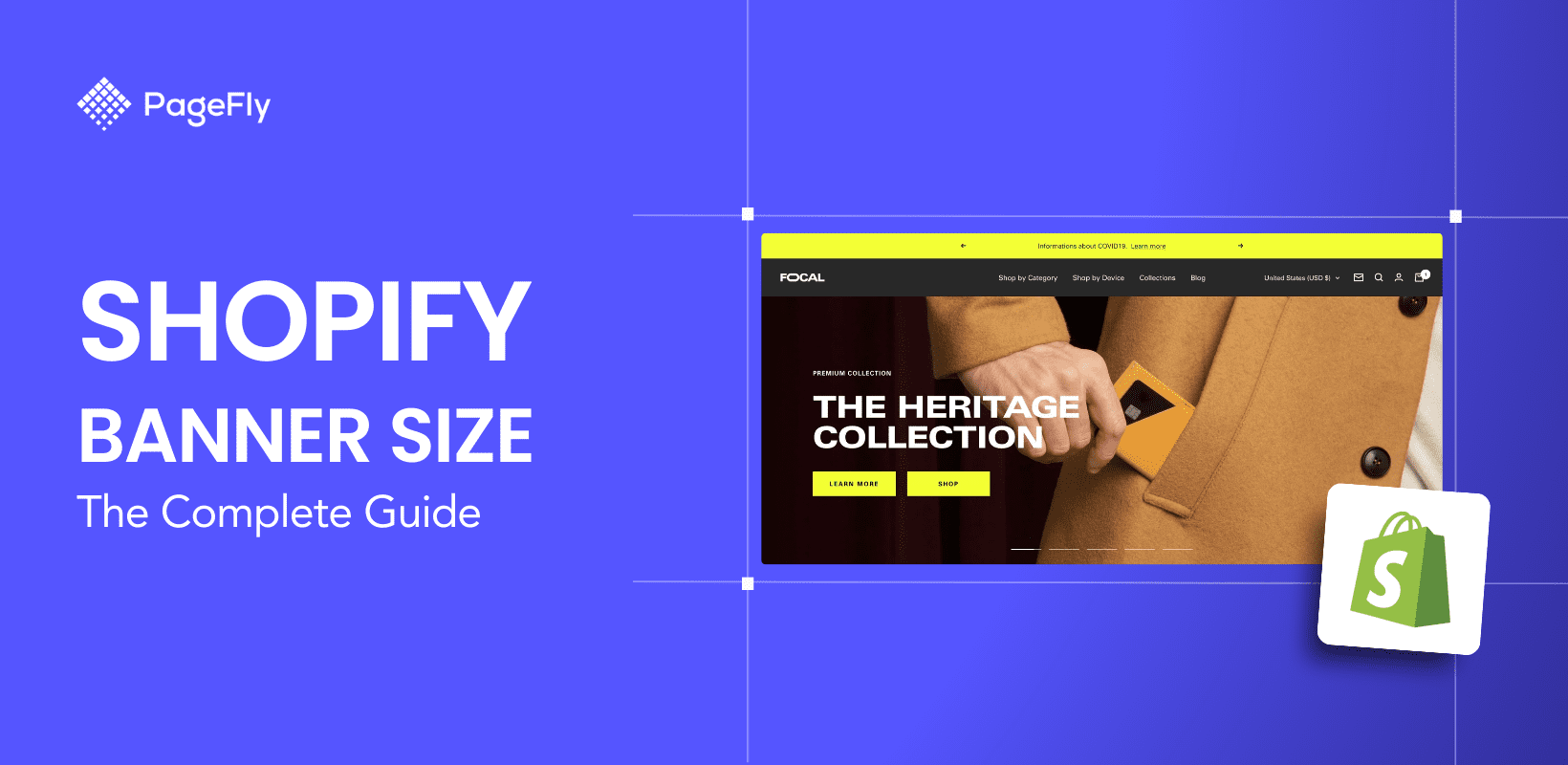
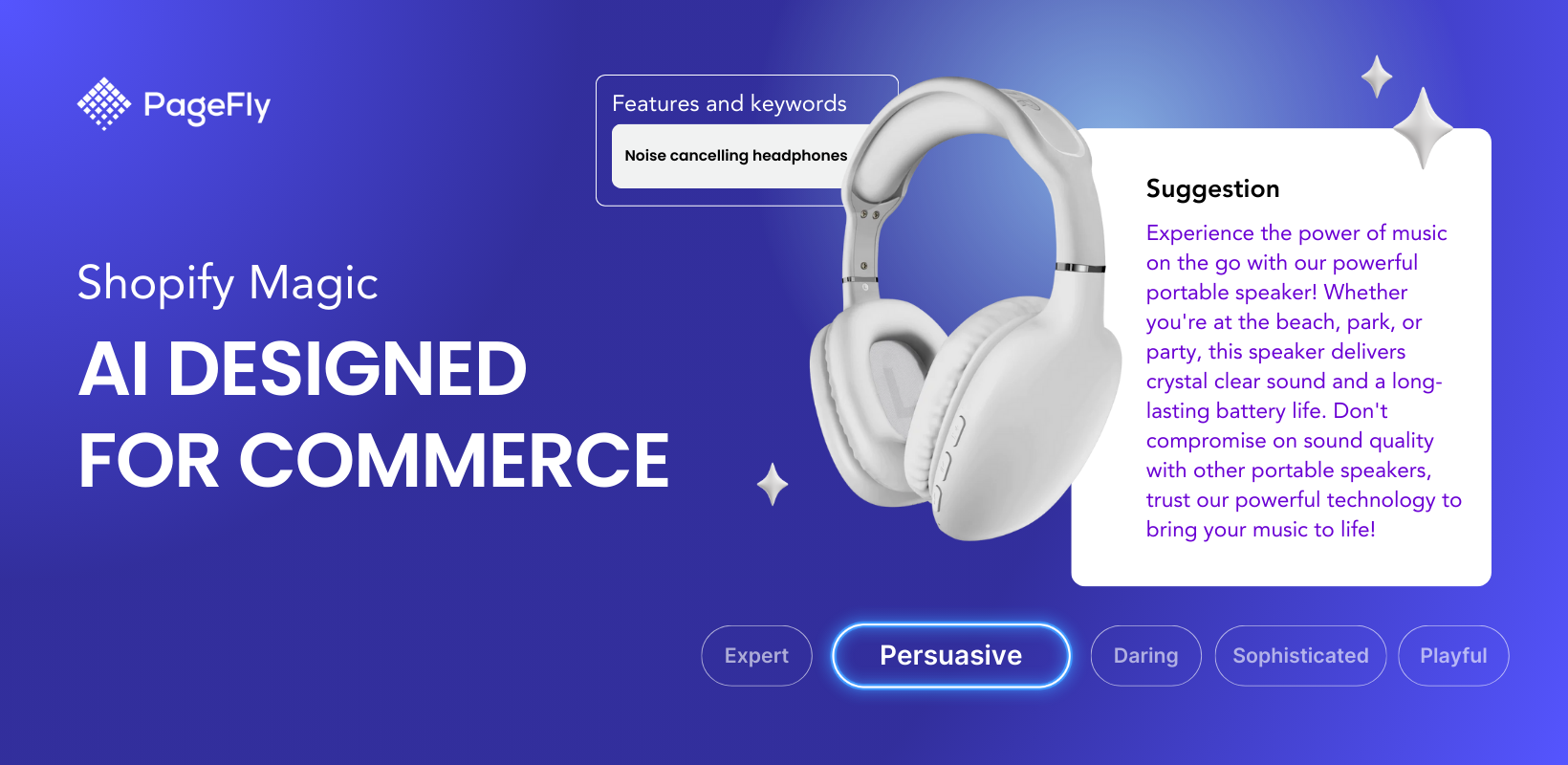

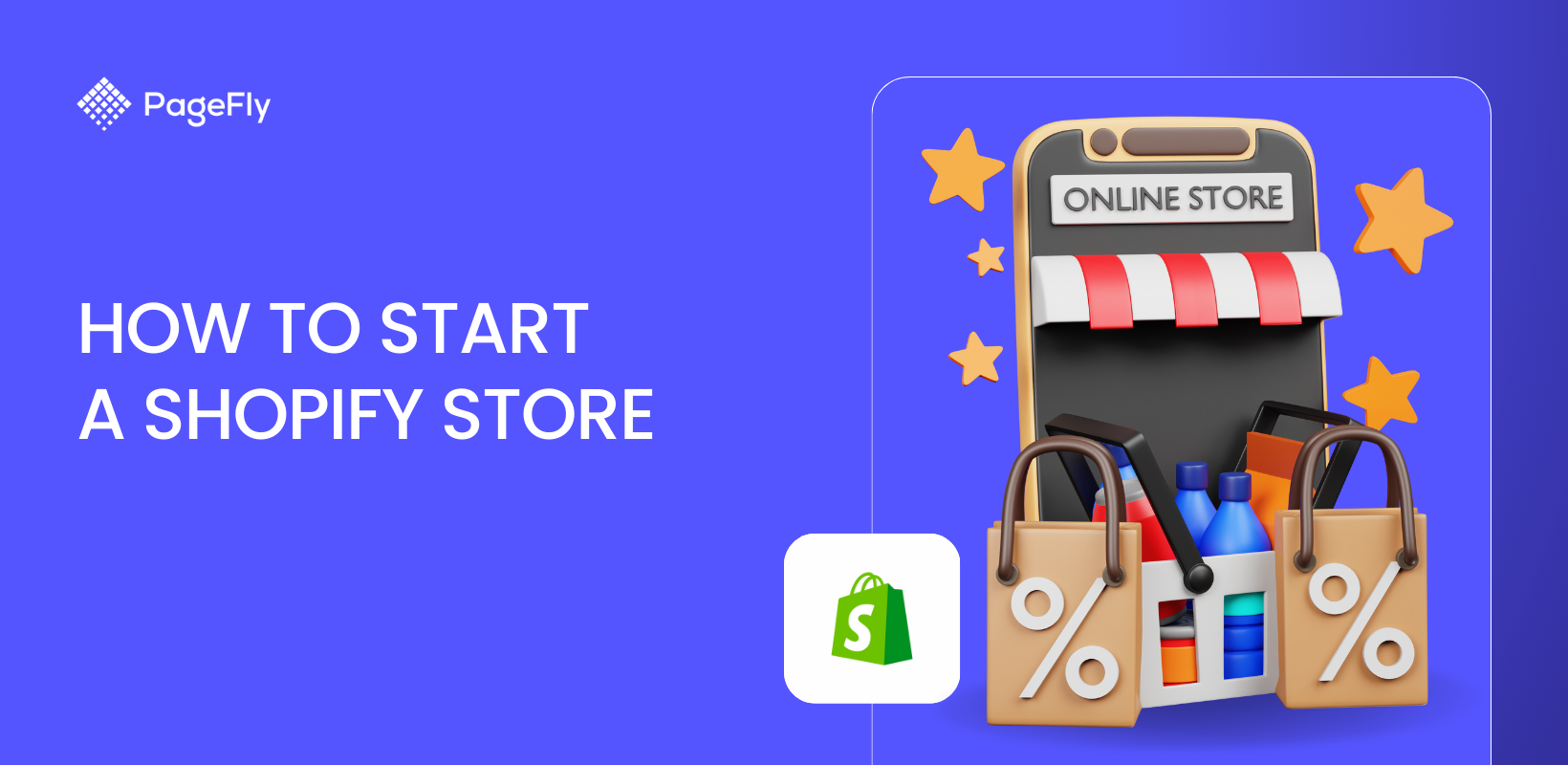
![27 Best Shopify General Stores + Complete Strategy Guide [2025]](http://pagefly.io/cdn/shop/articles/Best_Shopify_General_Stores_2f9d09f2-7c38-4da9-a495-e9f4898ddd68.jpg?v=1757271936&width=1640)
